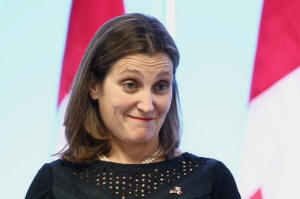No breakthrough at NAFTA talks, U.S. timeline could be
in doubt
 Send a link to a friend
Send a link to a friend
 [April 07, 2018]
By David Lawder and David Ljunggren [April 07, 2018]
By David Lawder and David Ljunggren
WASHINGTON/OTTAWA (Reuters) - The United
States, Mexico and Canada still have to resolve major issues around
NAFTA, Canadian Foreign Minister Chrystia Freeland said on Friday,
casting doubt that the quick deal sought by Washington would
materialize.
Freeland met with U.S. Trade Representative Robert Lighthizer and
Mexican Economy Minister Ildefonso Guajardo for several hours on Friday
but made clear there was a lack of consensus on the North American Free
Trade Agreement (NAFTA).
"We had some constructive conversations both yesterday and today ... and
that intensive pace of work, which has been happening over the last
couple of weeks, will continue in the days to come," she told reporters
outside the Washington building where the talks took place.
"We are going to keep on working until we get a good deal," she added,
saying negotiations would continue at the level of officials.

Lighthizer, citing the need to reach a deal an agreement before the
Mexican presidential election on July 1, says he wants the outlines of a
deal soon to update the regional trade agreement.
A brief statement from Lighthizer's office said the talks had been
positive and added that "we will continue working to achieve an
agreement that benefits our three countries."
Mexico's economy ministry said the three countries agreed on Friday that
their negotiating teams should press on with technical work in coming
days and try to find "the balance that enables the process to move
forward in its entirety."
Mexican business lobby CCE said in a statement that it would accompany
the country's negotiating team.
"The continuation of the meetings is a positive sign, and there is a
window of opportunity to advance substantially toward an agreement,"
Juan Pablo Castañón, president of the business lobby, said in the
statement.
U.S. President Donald Trump, who has repeatedly threatened to walk away
from the $1.2 trillion pact unless major changes are made, on Thursday
said the three nations should have something to announce fairly soon.
Unveiling the outlines of a deal -- which Canadian and Mexican officials
had initially suggested might happen at a regional summit in Peru next
week -- would allow leaders to claim a political victory while leaving
officials to work out the precise details in the months to come.
[to top of second column] |

Canadian Foreign Minister Chrystia Freeland gestures during a joint
news conference on the closing of the seventh round of NAFTA talks
in Mexico City, Mexico March 5, 2018. REUTERS/Edgard Garrido

It would also enable Trump and his trade team to focus on a widening trade
dispute with China that could hurt the world's two biggest economies.
But there are major challenges to overcome, in particular a contentious U.S.
demand that the North American content of vehicles made in NAFTA countries be
increased to 85 percent from 62.5 percent.
"We continue to work in that area and to make some good progress and advances,"
said Freeland, who gave no details.
Insiders say the issue of automotive content has to be nailed down before an
agreement in principle can be struck.
"We are dealing in black and white. You can't leave things gray," said one
source with direct knowledge of the talks, citing the huge complexity of the
industry.
"The last thing you want to do is to be making something that isn't compliant
and to be told in an audit, 'You're not NAFTA compliant and you owe duties,'"
said the source, who requested anonymity given the sensitivity of the situation.
Talks to modernize NAFTA started last August but have made little progress,
prompting the United States to suggest at the end of the seventh formal round
last month that the three nations aim in the first instance for a deal in
principle.
The lack of clarity over the pact's future has hit the Canadian and Mexican
currencies in recent months as well as worried financial markets, which are on
edge about possible damage to the highly integrated North American market.

The chief executive of Royal Bank of Canada, Dave McKay, on Friday said
uncertainty over the pact was a concern for customers of the bank, Canada's
biggest lender, but he remained hopeful a deal would be reached.
(Additional reporting by Sharay Angulo and Anthony Esposito in Mexico City, Matt
Scuffham in Toronto; Editing by Leslie Adler and Sandra Maler)
[© 2018 Thomson Reuters. All rights
reserved.] Copyright 2018 Reuters. All rights reserved. This material may not be published,
broadcast, rewritten or redistributed.
Thompson Reuters is solely responsible for this content. |